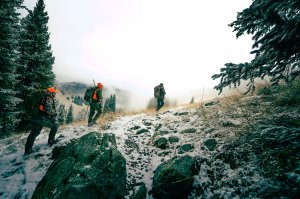It’s a rare day when Congress, especially the House of Representatives, does something helpful for hunters and anglers. But yesterday, it came close.
On a 274-146 vote, the House passed the Sportsmen’s Heritage Act. Championed by the Safari Club and the Congressional Sportsmen’s Foundation, the “Heritage Act” is actually a number of bills crammed into one piece of legislation. On its face, this act looks like a win for outdoorsmen and women, but let’s take a closer look at what’s actually in it before we break out the champagne…
The bill as passed by the House would allow for the importation of legally harvested polar bears from Canada, a good thing. Honest hunters who participate in our sport should not be penalized for following the laws and hunting practices of other countries.
The bill would also disallow the EPA from regulating lead in ammunition. Back in 1976, Congress passed a law that took the EPA’s authority away to regulate ammunition of any kind, but environmental groups like the Center for Biological Diversity have contended that the EPA still had the authority to regulate ammo. While there is a growing body of evidence that lead in game bullets does have an impact on wildlife, supporters of lead bans often times launch into hyperbolic attacks against hunters. The truth about lead and lead ammo bans is this: It should be up to each individual state to decide what’s right for hunters, and hunters should be heavily engaged in the decision making process.
But there are some more controversial provisions in the bill. The main thrust of the bill is to ensure that federal land management agencies respect the rights of hunters and anglers and embrace the hunting and angling heritage on our public lands. This is a concept that a vast majority of Americans embrace. This fight gained momentum after the US Forest Service tried to ban the use of firearms in a Michigan Wilderness Area citing close proximity to folks who’ve moved out to the country for a rural lifestyle, and then discovered that a rural lifestyle meant there were folks with guns in the woods each fall.
I want to be perfectly clear, hunting and fishing in wilderness areas, at least where I live in Montana, offers some of the best opportunities anywere. We can hunt bull elk in the rut in the Bob Marshall and Absorka-Beartooth Wildernesses. I’ve caught trout (on a pink Zebco no less) — that would have been wall hangers in anyone’s book — in high mountain lakes and one day I hope to take a trophy Billy from the Eastern Rocky Mountain Front. Hunting and wilderness go together like Boone and Crockett.
So why would anyone oppose a bill that demands our hunting and angling heritage be protected by the same federal agencies we task with managing our public land habitat? Because the bill is poorly worded.
According to the Congressional Research Service, the bill would open Wilderness Areas to motorized use, oil and gas development, logging and a host of other activities that would cut the heart out of protective designations like Wilderness Areas. In fact, the CRS didn’t have much in terms of kind words for this bill:
“Because of imprecise wording in the bill, the full extent of the bill’s impact on the Wilderness Act is unclear. However, it appears that Section 104(e) would not only allow any activity related to fishing, hunting or wildlife conservation to be conducted in wilderness areas, but it may also obviate the primacy of wilderness values in determining permissible activities in wilderness areas.“
The reason you can hunt elk in the rut with a rifle on a general tag is because of the protections that wilderness brings us. Eliminating those protections, and punching roads and motorized trails into wilderness won’t help keep those liberal seasons.
The intent of this bill is grand, and I’m 100 percent in support of the mission. In my opinion legislators just need to change some tactics and amend the bill to ensure that we do not violate the 1964 Wilderness Act, while ensuring that we can always hunt and fish on public lands. Hunters and anglers enjoy wide-spread support among the greater non-hunting public because of our strong conservation ethic. When we advance proposals such as this, our support diminishes, and unnecessarily so.
Hopefully the Senate can amend this bill and create a positive win for hunters and anglers. Lord knows we need it.

